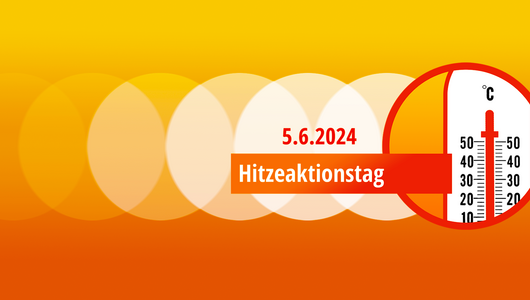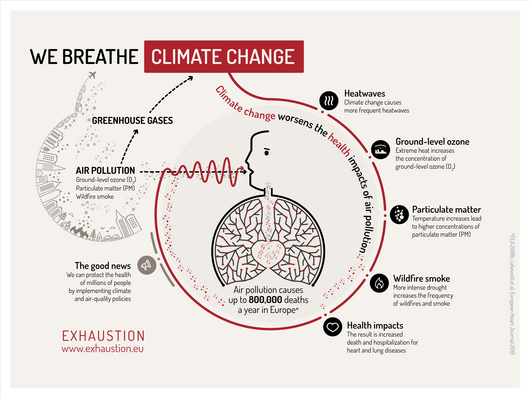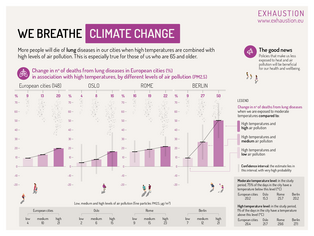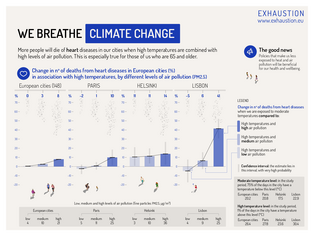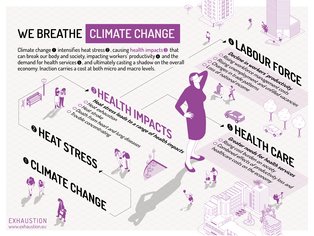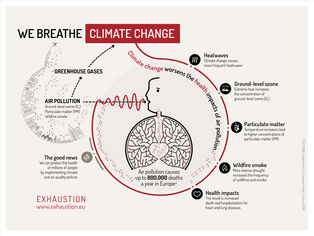Heat and Health
Our environment is changing rapidly, and rising temperatures are leaving significant traces. The causes and effects of diseases are exacerbated by heat, from asthma and allergies to heart attacks, strokes, and even metabolic disorders like diabetes. At Helmholtz Munich, we explore the intricate interplay between the environment and humans, as well as the impacts of heat on health. We collect and analyze data from Germany's largest population-based health study, encompassing millions of human samples, and work on solutions for the immense challenges of climate change for our health.
Our environment is changing rapidly, and rising temperatures are leaving significant traces. The causes and effects of diseases are exacerbated by heat, from asthma and allergies to heart attacks, strokes, and even metabolic disorders like diabetes. At Helmholtz Munich, we explore the intricate interplay between the environment and humans, as well as the impacts of heat on health. We collect and analyze data from Germany's largest population-based health study, encompassing millions of human samples, and work on solutions for the immense challenges of climate change for our health.
Climate change affects our health, the environment, and ecosystems. We conduct research at the intersections of the environment and human health.
Further reading
Study on heat-related deaths in Germany in 2022
Estimating the excess mortality attributable to heat is a central element of the documentation of the consequences of climate change for human health. Until now, estimates of heat- related deaths in Germany by the Robert Koch Institute (RKI) have been based on weekly mortality records. This study is the first to use higher resolution data—i.e. daily all-cause mortality linked to daily mean temperatures—from each of the German federal states to assess the heat-related mortality from 2000 to 2023 in Germany.
Huber V, Breitner-Busch S, He C, Matthies-Wiesler F, Peters A, Schneider A: Heat-related mortality in the extreme summer of 2022—an analysis based on daily data. Dtsch Arztebl Int 2024; 121: 79–85. DOI: 10.3238/arztebl.m2023.0254
Heat and Cardiovascular Mortality
As global temperatures rise, extreme heat events are projected to become more frequent and intense. Extreme heat causes a wide range of health effects, including an overall increase in morbidity and mortality. It is important to note that while there is sufficient epidemiological evidence for heat-related increases in all-cause mortality, evidence on the association between heat and cause-specific deaths such as cardiovascular disease (CVD) mortality (and its more specific causes) is limited, with inconsistent findings. Existing systematic reviews and meta-analyses of epidemiological studies on heat and CVD mortality have summarized the available evidence. However, the target audience of such reviews is mainly limited to the specific field of environmental epidemiology. This overarching perspective aims to provide health professionals with a comprehensive overview of recent epidemiological evidence of how extreme heat is associated with CVD mortality.
Nidhi Singh, Ashtyn Tracy Areal, Susanne Breitner, Siqi Zhang, Stefan Agewall, Tamara Schikowski and Alexandra Schneider: Heat and Cardiovascular Mortality: An Epidemiological Perspective. 25 Apr 2024, Circulation Research. 2024;134:1098–1112
White Paper: Exposure to heat and air pollution in Europe
In June 2019 a consortium of researchers from different disciplines and ten European countries began a journey together in the Horizon2020 climate change and health project EXHAUSTION. The starting point was how the effects of heatwaves, air pollution and a changing climate leads to more heart and lung diseases in Europe, and premature deaths related to these challenges. The aim of the project has been to identify adaptation strategies that will help avoid premature death and disease among vulnerable groups. This includes older people, the chronically ill, and disadvantaged people. The overall goal was to increase European resilience.
As part of the legacy of the project we have developed a White Paper including five stand alone chapters which reflects a selection of important findings and results from the project related to the questions above. The paper includes key research and policy recommendations, and we recommend you to read them.
Gunnell E. Sandanger et. al: The Exhaustion Project.
Articel: Impact of high outdoor temperatures and heat waves on pulmonary diseases
Role of pneumologists in health-related heat protection
Individuals with chronic pulmonary diseases are particularly affected when high temperatures coincide with high levels of air pollution. Heat-related lung problems, such as increased pulmonary load through heat-related hyperventilation together with increased air pollution as well as effects associated with cardiac impairment and pneumonia increase the risk of morbidity and mortality for affected patients during heat waves.
Matthies-Wiesler, N. Nidens, S. Karrasch & A. Schneider: Zeitschrift für Pneumologie Volume 20, March 2023, p. 133-143.
Article: Climate Change up Close: Heat Waves Implications and Prevention
During heat waves, the risk for kidney-related morbidity and mortality increases. Acute kidney injuries, urolithiasis, electrolyte imbalances and urinary tract infections particularly occur. Chronic kidney diseases are also discussed as a possible consequence of climate change. The combination of heat, air pollutants and other environmental factors represents a particular burden for patients with kidney diseases.
N. Nidens et. al: Climate Change up Close: Heat Waves Implications and Prevention, 13. June 2023, Die Nephrologie, p. 203-212.






![Heat – when temperatures become a problem. Hitze – wenn die Temperaturen zum Problem werden. ["Structure Reference Image","Structure Reference Image","Reference Image","Generated image"]](https://images.admiralcloud.com/v3/deliverEmbed/905089a2-b997-4f51-904b-2e1d5f153617/image/cropperjsfocus/464/192/0,0,1920,1097,0,1,1/960,548.4999999999999?poc=true)









